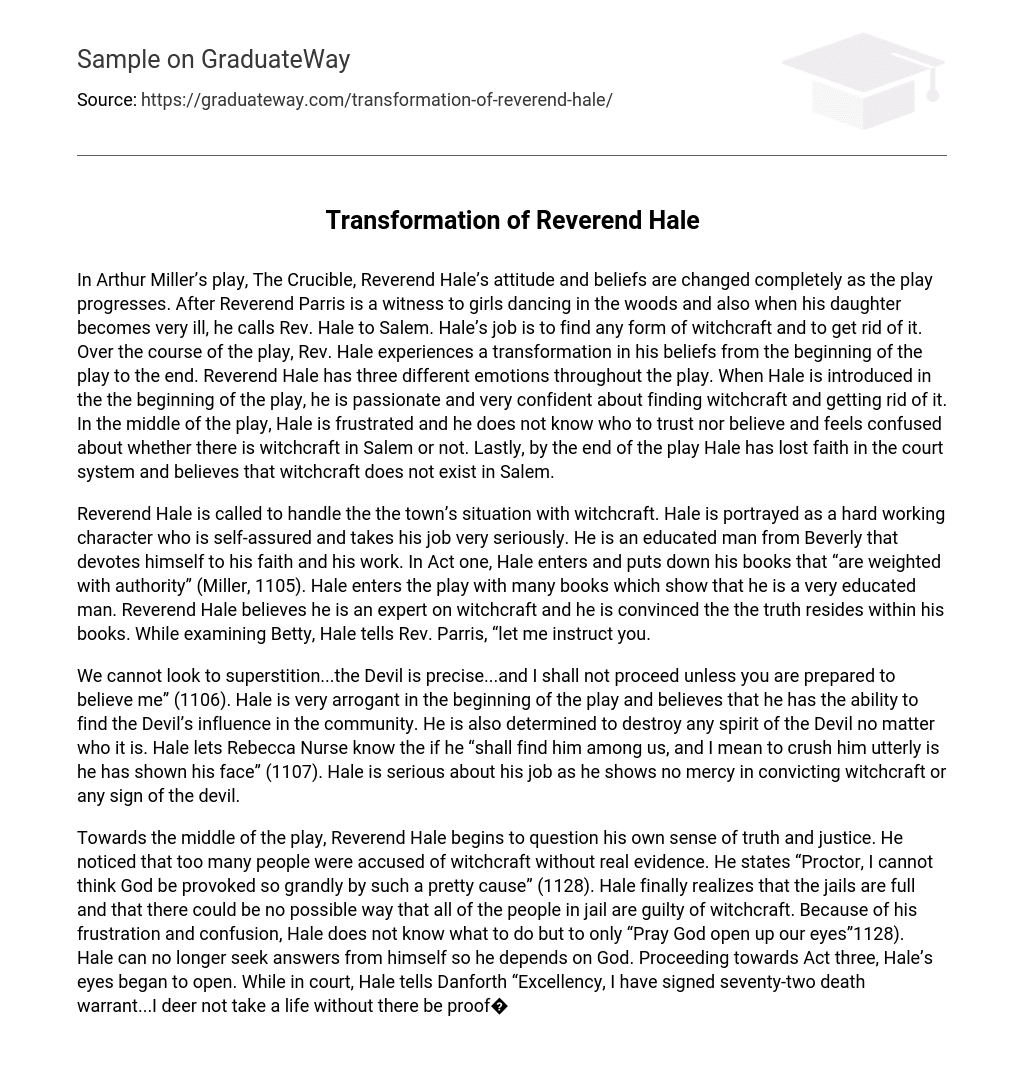In Arthur Miller’s play, The Crucible, Reverend Hale’s attitude and beliefs are changed completely as the play progresses. After Reverend Parris is a witness to girls dancing in the woods and also when his daughter becomes very ill, he calls Rev. Hale to Salem. Hale’s job is to find any form of witchcraft and to get rid of it. Over the course of the play, Rev. Hale experiences a transformation in his beliefs from the beginning of the play to the end. Reverend Hale has three different emotions throughout the play. When Hale is introduced in the the beginning of the play, he is passionate and very confident about finding witchcraft and getting rid of it. In the middle of the play, Hale is frustrated and he does not know who to trust nor believe and feels confused about whether there is witchcraft in Salem or not. Lastly, by the end of the play Hale has lost faith in the court system and believes that witchcraft does not exist in Salem.
Reverend Hale is called to handle the the town’s situation with witchcraft. Hale is portrayed as a hard working character who is self-assured and takes his job very seriously. He is an educated man from Beverly that devotes himself to his faith and his work. In Act one, Hale enters and puts down his books that “are weighted with authority” (Miller, 1105). Hale enters the play with many books which show that he is a very educated man. Reverend Hale believes he is an expert on witchcraft and he is convinced the the truth resides within his books. While examining Betty, Hale tells Rev. Parris, “let me instruct you.
We cannot look to superstition…the Devil is precise…and I shall not proceed unless you are prepared to believe me” (1106). Hale is very arrogant in the beginning of the play and believes that he has the ability to find the Devil’s influence in the community. He is also determined to destroy any spirit of the Devil no matter who it is. Hale lets Rebecca Nurse know the if he “shall find him among us, and I mean to crush him utterly is he has shown his face” (1107). Hale is serious about his job as he shows no mercy in convicting witchcraft or any sign of the devil.
Towards the middle of the play, Reverend Hale begins to question his own sense of truth and justice. He noticed that too many people were accused of witchcraft without real evidence. He states “Proctor, I cannot think God be provoked so grandly by such a pretty cause” (1128). Hale finally realizes that the jails are full and that there could be no possible way that all of the people in jail are guilty of witchcraft. Because of his frustration and confusion, Hale does not know what to do but to only “Pray God open up our eyes”1128). Hale can no longer seek answers from himself so he depends on God. Proceeding towards Act three, Hale’s eyes began to open. While in court, Hale tells Danforth “Excellency, I have signed seventy-two death warrant…I deer not take a life without there be proof” (1140).
He learns that he must investigate and find full evidence before convicting someone of witchcraft. He can not depend on anyone else’s testimony until he has seen it himself. His attitude has changed from being so self-assured to having some doubts. At the end of the play, Reverend Hale has lost faith in the court and is convinced witchcraft does not exist. He no longer trusts the girls and he finally believes that Proctor is innocent of witchcraft. While in court for John Proctor, Hale speaks up to Parris, “ Is every defense an attack upon the court? Can no-one?” (1136). This is the first time Hale speaks up against the court. It is an unusual occurrence because in the beginning of the play, Hale had put his faith into the court system and now he questions it. Later in the court, when Elizabeth denies Proctor of lechery,
Hale tries to save Proctor because he knows he will be hanged. He tries to change the judge’s mind when he states, “Excellency, it is a natural lie to tell: I beg you, stop now before another is condemned” (1148). Hale cares and tries his best to save Proctor. Hale is upset and has no more faith in the court system. Proctor is later found guilty and he is ordered to be taken to jail. With anger, Hale speaks out, “I denounce these proceedings, I quit this court” (1151). Hale can no longer take part in a court system that hangs innocent people. He publicly declares that the court’s rulings are wrong which reveal his frustration and his rejection to the court. Reverend Hale is no longer the same man who had his faith in the court when he had first arrived in Salem. Over the course of the play, The Crucible by Arthur Miller, Reverend Hale has changed dramatically from the start of the play to the end.
At first, Hale is convinced that he is an expert of witchcraft and the truth is found in his books. He also comes into Salem putting his faith into the court. As the play goes on, Hale questions his belief because he realizes that many people are being convicted without definite evidence. In the end of the play, Hale has no faith in the court. He realizes many people innocent people have died through the courts rulings and therefore he can not be a part of it. Hale’s character has changed significantly throughout the play.





